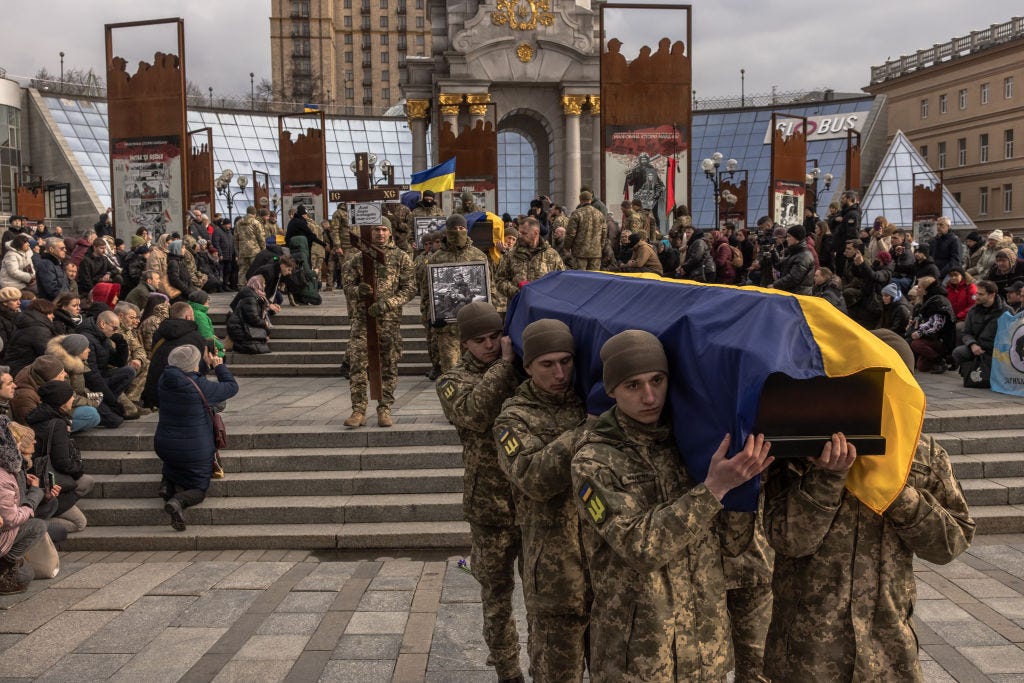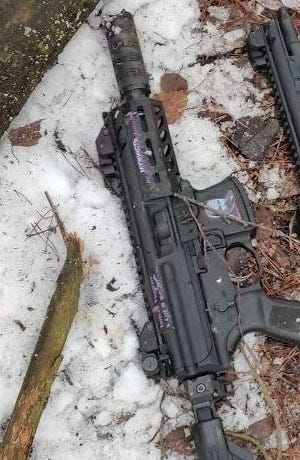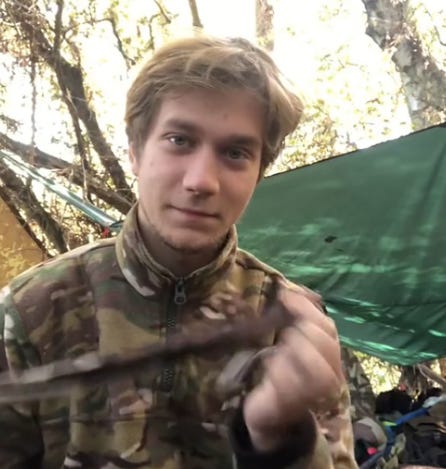A Ukrainian saboteur group’s desperate last stand
Exploring the true meaning of courage, inside the mind of a man who operated behind enemy lines. And in reporter’s notebook, Ross writes about why he became almost obsessed with this man’s story.
Editor’s note: These are dark, cold days in Ukraine. We are persevering despite a substantial decrease in the number of paid subscribers over the past week. 93% of our readers don’t pay for our work. Will you help improve those numbers by supporting us?
Right after Christmas 2022, Russian intelligence services posted a video showing the scene of a terrible battle.
On the ground were the blurred-out bodies of Ukrainian saboteurs, who had made their way behind enemy lines.
One tiny detail stood out to me, a detail I couldn’t get out of my head: on one of the weapons, I spotted a sticker that said simply, “bravery,” in Ukrainian.
If the war goes on, as it now looks like it will, for years to come, sabotage groups and partisan action will become one of the main ways that Ukraine and Russia fight. Over the course of the last year, numerous Russian and Ukrainian teams have tried to infiltrate past the frontlines lines to wreak havoc on logistics and infrastructure.
This sabotage group, named ‘Svyatosha,’ or ‘Saint,’ was a group of close friends, a second family bound together not only because of war but with common ideas and values.
They were members of the Brotherhood of Korchynsky – a Christian organization that consists of absolutely devoted Ukraine patriots. Their strong ideology makes them perfect for conducting some of the most daring and skillful operations in enemy-held territory, often in cooperation with Ukrainian special operation forces. Despite the importance of this work, it often comes with a big price.
The youngest of the saboteur group was a man codenamed ‘Apollo.’
He was only 19 years old.
It’s funny how a little detail can pull many other thoughts to the surface. I couldn’t stop thinking of it, and the questions that came after – thoughts about self-sacrifice, of life’s purpose, and the true meaning of bravery.
A couple of days later I saw a video showing all of the group smiling and joking that this may be their last video together. It was. At least, it was the last footage of them alive.
In the background was a song, which spoke about ‘Kharcyz,’ which can be translated as ‘robber’ or ‘outlaw.’ The Kharcyz were originally a group of people in the 16th century, mostly villagers that ran away from serfdom and injustice, and settled between rivers Kalmius and Mius. They were free spirits and rebels, living outside society at the border of the ancient lands of Moskovia and Zaporozhian Sich.
Doing a job like this you know death is going to happen one day, but the video shows there was no hesitation among these men.
Free spirits, rebels of the society, daredevils in their nature but faithful Christians in their belief, they were without question willing to do anything for this country and they proved it by sacrificing their most valuable resource – their lives.
I began wondering to myself: “where do we get these people from? Are they military? What was this Brotherhood that prepared them? And how can a 19 year old guy with no prior military experience get to this level of operations?”
I met with Marat Saifulin, an older member of the Brotherhood of Korchynsky. We discussed the nature of the brotherhood, its values and ideas. Marat has been with the brotherhood for almost 20 years, and participated in pro-Ukrainian demonstrations and campaigns in Moldova and Russia in the early 2000s.
Marat told me that people in the brotherhood are not there by accident. All the people there are absolute patriots of Ukraine and faithful Christians.
“We carry brotherhood traditions from ancient times,” he said. “We are a historical commune with historical roots. And we try to influence the religious and political sphere in society and, for the time being, also the military.”
Dmytro Korchynsky, the leader of the brotherhood, set as his goal the revival of a traditional, independent, patriotic church in Ukraine – separate and apart from Russia. He had one condition: that this church would not be a “church of martyrs, but a church of warriors.”

In the video was a particular group of brave and mostly long-serving men. Svyatosha, Nepuypyvo and Tarasiy were old members of the Brotherhood. They came at different periods. But they were with the Brotherhood for many years. The only exception was Apollo, who joined the Brotherhood at the beginning of the full scale invasion.

Marat describes them as more than just a group of soldiers. They were people with a common ideology and interests and beliefs and they always helped and supported each other. “They were like a family,” he explained to me.
The teenaged ‘Apollo’ was just one of them. His call sign was the God of the Sun, but his real name was Bohdan.
“When the war comes, and it will come, I promise I will go to fight,” Bohdan told his father Oleksander in one of their talks.
And on the contrary to many others – older, tougher, stronger; many of those who declared themselves fighters, warriors and other important titles – this young man kept his word.
Bohdan Lyahow was born in a small city of Zhovti Vody, with a population of just over 40,000. He showed some talent in drawing, and played multiple musical instruments. He was especially interested in history and philosophy.

Before his teenage years Bohdan was, according to his mother Marina, like “God’s blessing.” She was especially worried about him when, in keeping with his word, he began fighting for the Ukrainian cause after the full-scale Russian invasion.
“It was really scary at that time, specifically when they were around Kharkiv, he was saying ‘Mom, I’m not sure if I can take it, I’m afraid that I may want to go back home,’” Marina recalled. “I have always asked him, when the moment comes, to give up and to try to survive. I always told him that he is artistic and he has a chance... But he was with the boys and he made his choice. And I respect this choice.”
I had a mixture of feelings as I listened to Marina’s words.
I was speaking to a mother who that not that long ago, had lost their only child, a child who was even younger than myself, yet resilient enough to make a decision and stick to it, no matter what else is happening.
Marina showed me Bohdan’s room, and that it is covered in printed portraits of philosophers and great thinkers. I noticed Schopenhauer, Nietzsche, Goethe, and Shakespeare there.
“People who inspired him,” Marina explained, as she showed me pictures.
Bohdan was interested in the military, but didn’t want to participate in an old, Soviet-style army. That’s when he met members of the Brotherhood of Korchynsky.
“He called me and said, ‘Mom you can’t even imagine what people I’m surrounded [by] here,’” Marina recalled.
His father Oleksandr continued, “this is a place full of artists, philosophers, free thinkers.”
At the beginning of the invasion Bohdan was in Kyiv with his friend. His friend left the city when the Russians began to surround it, but he decided to stay to defend the capital.
Despite Ukraine having been on the brink during the first weeks of war, the flow of people that rushed to defend their country was well beyond the state’s capacity to arm and organize them all.
For three days he was waiting for a call back from territorial defense, and on the fourth day, Bohdan, unwilling to wait any further, joined the Brotherhood.
“We tried everything parents would try to save their child. I told him to come back.. that he can join territorial defense here and protect the house,” his mother recalled.
“History is written here, in Kyiv/ I’m staying here and I will join some volunteer battalions. If they won’t take me, I will just steal some guns and go fight myself,” Bohdan replied.
His father Oleksandr told me that in his childhood, Bohdan came home one day all red, with some of his clothes ripped, and answered that they were “just playing with snowballs.”
Two days later Oleksandr discovered that Bohdan had beaten up some older guys from school, because they were bullying him and his friends, and this sense of injustice made him so wild, that the older guys had to stand back.
“He had his own sense of bravery, and it resulted in him going with the guys. Because no one ever forced them to go. Who raised his hand – goes. And he was always telling his mother that he can’t simply stay back, others are going and he also has to go. Because they were like family,” Oleksandr said.

We humans have short memories, particularly during a time of war when things can be so chaotic.
Shortly after the Ukrainian saboteur group was killed, Dmytro Korchynsky, leader of the Brotherhood, initiated a petition that demanded that the men be honored with the Hero of Ukraine award.
Despite a petition gathering 25,000 signatures, no actions have been taken.
The circumstances of the group’s last fight and death are also uncertain.
The Russian intelligence services claimed that the group mistakenly walked onto a minefield. Yet the bodies from the video and later testimonies of the families include multiple bullet wounds, which indicates that they fought one last, heroic stand against the Russians.
After the paywall: A press investigation shows how Chinese cameras widely used in Ukraine pose a security risk; and Ross explains why he became so focused on learning more about the saboteur group, as well as his view on what the future of the war holds.
Keep reading with a 7-day free trial
Subscribe to The Counteroffensive with Tim Mak to keep reading this post and get 7 days of free access to the full post archives.





